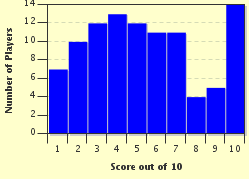Quiz Answer Key and Fun Facts
1. Well, let's get started. One of the earliest songs of praise is mentioned in the book of Exodus. According to chapter 15:1-21, Moses and his sister Miriam are similar to a "choir director" and a "choreographer". They lead the people in song and dance to praise God. What was the occasion of such jubilation? (KJV)
2. In one of the books of the Old Testament, we see an occasion where the children of Israel are singing to... ready for this?
A well of water.
In which book do we read of people singing to a hole in the ground? (KJV)
3. There was once a king who grew very jealous because some women chose to honor him with a song, but they honored another man more. This king was almost beside himself with jealousy and rage. So much so, that the day after the song was sung, he threw a javelin at the other man whose name had been mentioned in the song. Later, this man himself became a king.
What king threw the javelin and of whom was he jealous? (KJV)
4. Not all songs found in the Bible are in the Old Testament. For example, many people may be unaware that Jesus sang, on at least one occasion, with his disciples. In which of the four gospels can we find Jesus singing? (KJV)
5. We read in 2 Chronicles 5:12-14 about a song of praise at the dedication of the temple in Jerusalem. When the singers, all dressed in white linen are accompanied by a hundred and twenty priests blowing on trumpets, something out of the ordinary occurs. What happened, according to the text? (KJV)
6. There are two occasions mentioned in the book of Revelation where songs are sung. In the fourteenth and fifteenth chapters, we read of two seemingly different groups of people singing praises to God. The first song has no lyrics written down, because it is a yet-to-be-written tune, or as worded in the King James Version, a "new song."
There is a record of the words to the second song, however. Whose song is this, according to Revelation 15:3? (KJV)
7. Once, while the early church was still in its infancy, two men in prison were singing at midnight. Suddenly, a great earthquake caused the prison to shake from its foundations and jolted all the doors open. Even the prisoners bonds were cut loose and the jailer completely freaked out and was going to kill himself because he feared they would all escape.
Name the two men who were singing just prior to the earthquake's occurrence. (Acts 16:16-34 KJV)
8. Mary, the mother of Jesus, sang a song of praise to God. Where was she when she spontaneously burst into song, magnifying God?
(Luke 1:34-56 KJV)
9. There are at least two New Testament books that advise ALL believers to praise God in hymns and in song. The two are almost identical in their wordings as well as their content. Each one also closes with the idea of singing in one's heart also.
Where can we find these two very similar scriptures? (KJV)
10. We might think it just a bit weird, nowadays, to imagine an army going off to war, led not by generals, armor or even soldiers. Consider how odd it would be if they army was led by a group of...singers. Hmm...
In 2 Chronicles, chapter 20, we see this very thing occurring. The singers who are mentioned in verses 18-28 had a specific job to do. They were instructed in exactly what to praise and what to say.
When the song was over and the battle ensued, how long did the inhabitants of Jerusalem spend in gathering up the spoils of their enemies afterward? (KJV)
Source: Author
logcrawler
This quiz was reviewed by FunTrivia editor
LeoDaVinci before going online.
Any errors found in FunTrivia content are routinely corrected through our feedback system.

